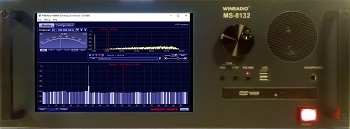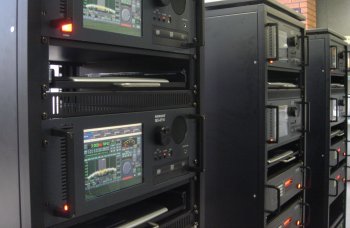The WiNRADiO MS-8132/WSB Sonobuoy Telemetry Multichannel Receiving System provides an elegant, fully integrated solution, specifically designed for reception and monitoring of VHF telemetry transmitters, in particular sonobuoy transmitters, on multiple channels.

This system is based on a 19" rack-mounted industrial computer. The front panel features a high-contrast wide-angle display with provision for connection of an external keyboard and mouse. The system can monitor all 99 sonobuoy channels in real time and processing up to 32 channels in parallel across the sonobuoy VHF range of 136 to 173.5 MHz. Other frequencies are available upon request.
The G66WSBi card-based receiver is at the heart of the MS-8132/WSB system. This being a high-performance receiver designed to operate in the harsh electromagnetic environment existing inside a computer-based system and ideally suited for simultaneous multichannel operation.
All 99 sonobuoy channels are monitored simultaneously. Thanks to SDR architecture, the channels are processed instantly in software.
The receiver's hardware offers extremely high dynamic range, high linearity and excellent sensitivity. The input is protected against voltage spikes and excessive power.
The receiver contains a self-diagnostics functionality with BIT (Built-In-Test) and thermal management to prevent damage if environment conditions change out of operational specs.
The software shows a graphical representation of the receiver (a virtual control panel), making it possible to observe the status of all 99 sonobuoy channels simultaneously at once. The selected channel can be monitored, and the real-time spectrum of the demodulated signal observed.
The audio parameters can be adjusted for the output sound (volume, audio-gain), played on WiNRADiO Digital Bridge™ Virtual Sound Card, and as well recorded to an audio file. The receiver's sensitivity/immunity can be optimized by use of the attenuator and preamplifier.
The software provides an option for distribution of the demodulated audio for up to 32 channels over a computer network using RTP to multiple destinations. The supported RTP audio formats are: linear PCM (16-bit, Mono, 44100 Hz), ITU-T G.711 PCM µ-Law (PCMU), ITU-T G.711 PCM A-Law (PCMA).
The optional AX-61S antenna complements the entire sonobuoy telemetry receiving system with a high-efficiency, ruggedized antenna designed to withstand harsh operating conditions in the marine environment.
The MS-8132/WSB Sonobuoy Telemetry Multichannel Receiving System is shipped in a specially designed ruggedized 19" rack-mounted chassis with built-in shock absorbers, to ensure safe shipping. The unit can then be either removed from the enclosure or operated from inside it. This is particularly useful for mobile operation.
For larger installations, various rack-mount options are available (see an example of a WiNRADiO multichannel system pictured on the right).

| Type | Direct-sampling, digitally down-converting software-defined receiver |
| Frequency range | 136 MHz to 173.5 MHz, 99 channels, 375 kHz channel spacing |
| Demodulation bandwidth | 250 kHz |
| Mode | WFM |
| Image rejection | >80 dB |
| P1dB | -7 dBm (Preamp OFF) -17 dBm (Preamp ON) |
| IP3 | 21 dBm (Preamp OFF) 7 dBm (Preamp ON) |
| Max. input processed level | +10 dBm |
| Input damage level | +34 dBm |
| Attenuator | 0-21 dB, adjustable in 3 dB steps |
| SFDR | 101 dB typ. (Preamp OFF) 97 dB typ. (Preamp ON) |
| Noise Figure | 14 dB typ. (Preamp OFF) 6 dB typ. (Preamp ON) |
| MDS | -130 dBm typ. @ 150 MHz, 500 Hz BW (Preamp OFF) -138 dBm typ. @ 150 MHz, 500 Hz BW (Preamp ON) |
| LO Phase noise | -145 dBc/Hz @ 10 kHz |
| Internal spurious | below -110 dBm |
| RSSI accuracy | 2 dB (for input signal range from noise floor to +7 dBm) |
| RSSI sensitivity | -140 dBm |
| ADC | 16 bit, 200 MSPS |
| Tuning accuracy | 0.2 ppm @ 25 °C |
| Tuning stability | 0.2 ppm (0 to 50 °C) |
| Antenna input | 50 ohm |
| Data output | Demodulated audio 48/64/96/128 kHz sampling rate 32-bit float mono digitized I&Q signal via API, or RTP stream in the formats: PCM: 44.100 kHz sampling rate, 16-bit, mono PCMU: ITU-T G.711 PCM µ-Law, 8 kHz sampling rate, 8-bit, mono PCMA: ITU-T G.711 PCM A-Law, 8 kHz sampling rate, 8-bit, mono |
| Self-diagnostics | BIT (Built-In test) of the signal and processing path Thermal management - temperature monitoring and logging, auto switch off by overheat |
| Power consumption | Selectable 100/120 or 220/240 VAC, 50 or 60 Hz, 110 W max |
| Operating temperature | 0 to 55 °C |
| Humidity | 20 - 90% non-condensing |
| Dimensions | 19" rack mount Height: 4U (6.9" = 177 mm Depth: 16.5" (415 mm) |
| Weight | 43 lb (19.5 kg) |
Specifications are subject to change without notice due to continuous product development & improvement.